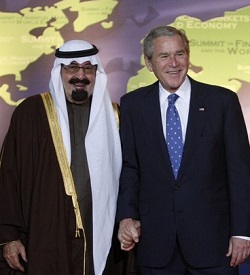January 23, 2015 – Washington, D.C. – Today, ADHRB released a report assessing the reign of Saudi Arabia’s King Abdullah bin Abdulaziz al-Saud, who died today after more than a decade of rule. Despite his adopted status as a reformer and peacemaker, King Abdullah’s reign was marked by deterioration in civil, political and human rights in the kingdom.
Please click here for a PDF of the report.
اضغط هنا لقراءة التّقرير باللغة العربيّة
During King Abdullah’s rule the government gained notoriety for arresting political prisoners and human rights defenders. In 2007, King Abdullah passed the Anti-Cyber Crime Law, which enables the judiciary to charge and try citizens for expressing dissenting views via social media. In 2008, the late king established the Specialized Criminal Court (SCC), with a mandate to prosecute anyone who “disturbs public order, shakes the security of society or subjects its national unity to danger, or obstructs the primary system of rule or harms the reputation of the state.” At the beginning of 2014, King Abdullah established the 2014 Penal Law for Crimes of Terrorism and its Financing, which allows the Kingdom to prosecute peaceful activity and political dissent as terrorism. The last several years of King Abdullah’s reign also saw an unprecedented increase in the targeting and harassment of women’s rights activists.
Human rights violations committed by the King Abdullah’s government extend beyond targeting dissent. Authorities regularly subject those convicted of criminal activity to inhumane and unusual punishments. Additionally, King Abdullah failed to protect the rights of the millions of migrant workers by upholding the kafala system.
In light of these and other human rights violations, ADHRB urges the new king, Salman bin Abdulaziz al-Saud, to chart a different course for Saudi Arabia. King Salman should ensure the immediate release of the nearly 30,000 prisoners of conscience in the kingdom and reform legislation to prohibit arbitrary arrest and unjustified detention for exercising basic rights. King Salman should also take steps to end systemic discrimination that disadvantages certain populations. Lastly, the government must meet the demands of Saudi women and implement reforms that will guarantee their full civil and political rights.
To encourage King Salman to improve his country’s human rights record, the United States should:
- Launch sustained, high-level public as well as private calls on the Government of Saudi Arabia to adhere to its human rights commitments and respect its position on the United Nations Human Rights Council by enacting meaningful reforms, including:
- The immediate and unconditional release of all political prisoners;
- The end of all forms of torture;
- The reformation of laws which restrict the rights of women; and
- The enactment of laws which shield migrant workers from abuse and exploitation.
- Ensure that the U.S.-Saudi military relationship is in full compliance with the intent of the “Leahy Law” to avoid complicity with human rights violations.
- Push for the full implementation of protections for freedom of religious belief and conscience.
- Organize, through the appropriate congressional committee, a hearing which examines the human rights violations enabled by the Penal Law for Crimes of Terrorism and its Financing.
Please click here for a PDF of this statement.
اضغط هنا لقراءة هذا البيان باللغة العربيّة





